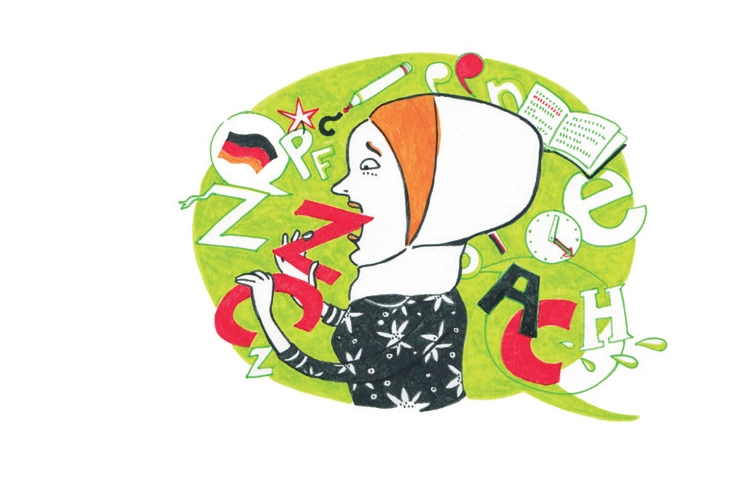Language pains: a call for patience
I tell my students that my back is aching in German. The other volunteering teachers told me right from the beginning to speak very slowly and clearly to them, so I stretch my words as good as I can: "Mein Rücken sch-m-e-r-z-t." I am quite impressed by what my tongue, lips, and breath can do to such a short word. I say "Mein Bauch sch-m-e-r-z-t" and hold my belly. Despite my perfect health, I am grimacing like someone with a severe stomach ache. My students have only been in Berlin for a few months. They come from Aleppo and Damascus and some of them are learning a new language for the first time in their life. How are you? What time is it? Where do you live? You start with the basics. Now we are playing doctor. My student Rania is raising her eyebrows in disbelief. She repeats “sch-m-e-r-z-t?” back to me and cannot believe this is a real word. Looking at me through her large glasses, she says in Arabic that if this is how it is, she won’t ever have pains again. How could anybody pronounce that properly? I don’t actually speak Arabic, but seeing the disgusted look on her face, I’m pretty sure that is what she said. Again she says “sch-m-e-r-z-t?” as clearly as possible, jumping from the “r“ to the “z“ and from the “z“ to the “t”. She auspiciously wipes her lips afterwards, although they are perfectly dry. Ahmed, next to her, can’t stop laughing.
I am suddenly beginning to doubt myself. Does anybody actually say “my belly is in pain“? Don’t we say “my belly hurts” or “I have a stomach ache“? So I tell them they can also say “Es tut weh” in German. Rania slowly shakes her head the way you would if a child climbed on a dishwasher to pinch more smarties from the cupboard. I open my hands apologetically. I can’t help it that German sounds the way it does: sharp, angular, and hissy. Before all that, we were practising the German “ch“ which is pronounced one way in “Dach“ or “Bauch“, but another way in “Licht“ – the sound sits either in the throat, or the mouth. Rania makes a dismissive gesture as if to say “This language is making me crazy.” I’m sure Arabic isn’t easy either, I think to myself. Then she touches my arm and pushes her notebook towards me. I know that means don’t worry, come on, we’re only joking. Words are unnecessary. Our faces, hands and voices are enough to understand each other.
“Okay,” I say to them. “Okay,” Rania repeats back to me. “Okay,” say Ahmed and Mohamad simultaneously. I point to the illustrations in the book, signaling them that they don’t all have to say “okay“. They show a tube of ointment, a bottle of cough syrup, tablets, and a band aid. I read out the words, Ahmed repeats after me. He jots down the pronunciation in Arabic. Band aid is “Pflaster” in German. “Flaster?” Is that right?” I emphasise the “Pf” and say “das Pf-laster“. I start laughing hysterically before Rania could even start to roll her eyes. Ahmed, Mohamad and all the others joins in. I put my head in my hands. Ahmed nudges me and points to his phone. Thanks to Google, he asks me in German “Frustrated?” and says “Geduld!” - have patience. Patience is exactly what is needed: my students have to be patient with me, I have to be patient with them, and together we need to be patient with the German language. I almost say that what we also need is “Toleranz“. But I don’t think they can take another word with “z“ in one lesson.
Dilek Güngör is a writer and journalist. She volunteers for the Berlin-based initiative Flüchtlingspaten Syrien e. V. which mentors refugees from Syria.
